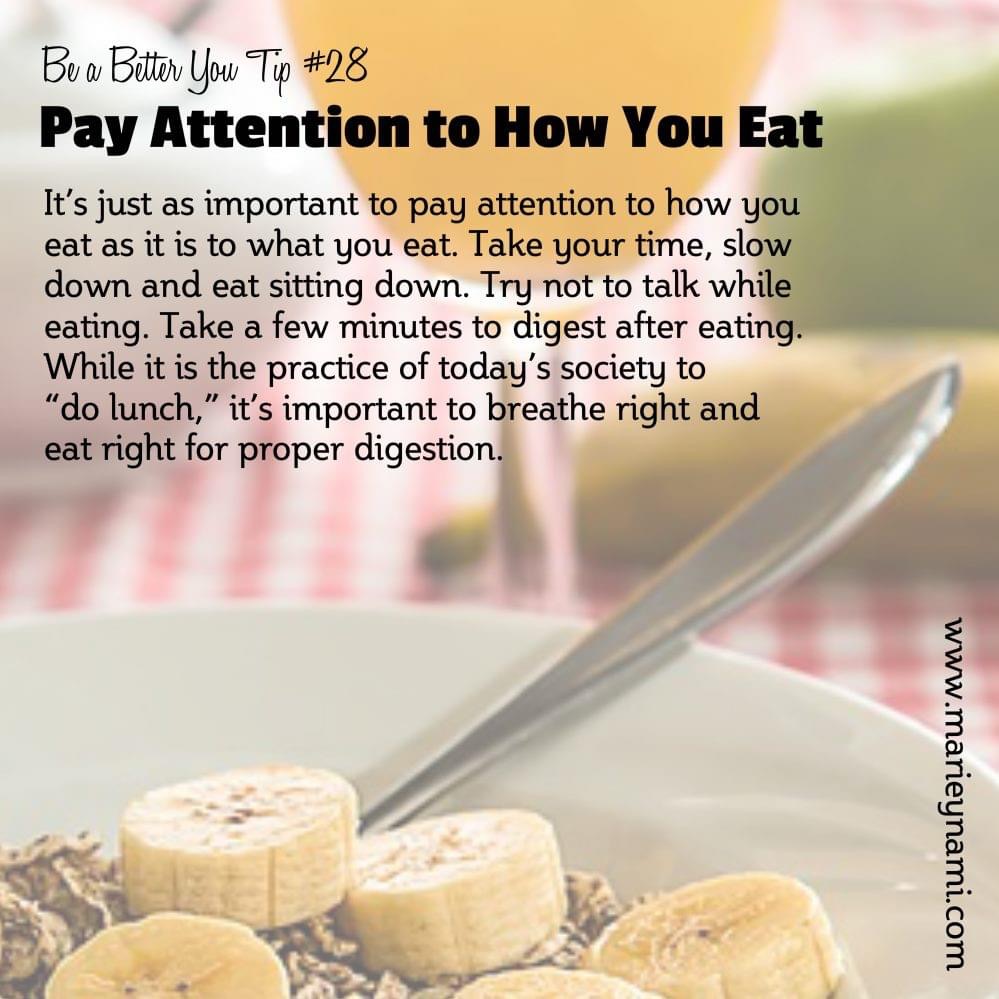
How quickly do you eat your meals? Make it a habit to eat slowly. If you need to … put your fork down after each bite. Enjoy each bite. Today, I challenge you to eat with no distractions (no phone, no TV, no talking).
FYNAMINAL POINT OF VIEW

How quickly do you eat your meals? Make it a habit to eat slowly. If you need to … put your fork down after each bite. Enjoy each bite. Today, I challenge you to eat with no distractions (no phone, no TV, no talking).

How long does it take to make a positive change in your life? How long does it take to improve your health and well-being? The answer is that it really only takes moments to change your health for the better. It only takes as long as you need to make the decision to take the first step toward better health.
One of the things that makes change so difficult isn’t the desire or decision to get healthy, it’s the planning and overwhelm that often comes next. Once you make the decision to improve your fitness, then what? What are the next steps? When do you know you’ve achieved success and how do you measure it? This is the power of a 21-day “Health Re-boot” challenge. This 21-day challenge gives you an idea for a day-by-day plan. You can choose to follow the plan, take the steps that are put in place, and at the end of the challenge, you will be able to measure your results. Most experts tell us that it takes 14-21 days to create a habit. All you have to do is take it one day at a time. You can do it!
Today is the day you start making positive changes to your health and fitness.To start off … here’s a question for you … what is one unhealthy habit that you have that you wish you can change?
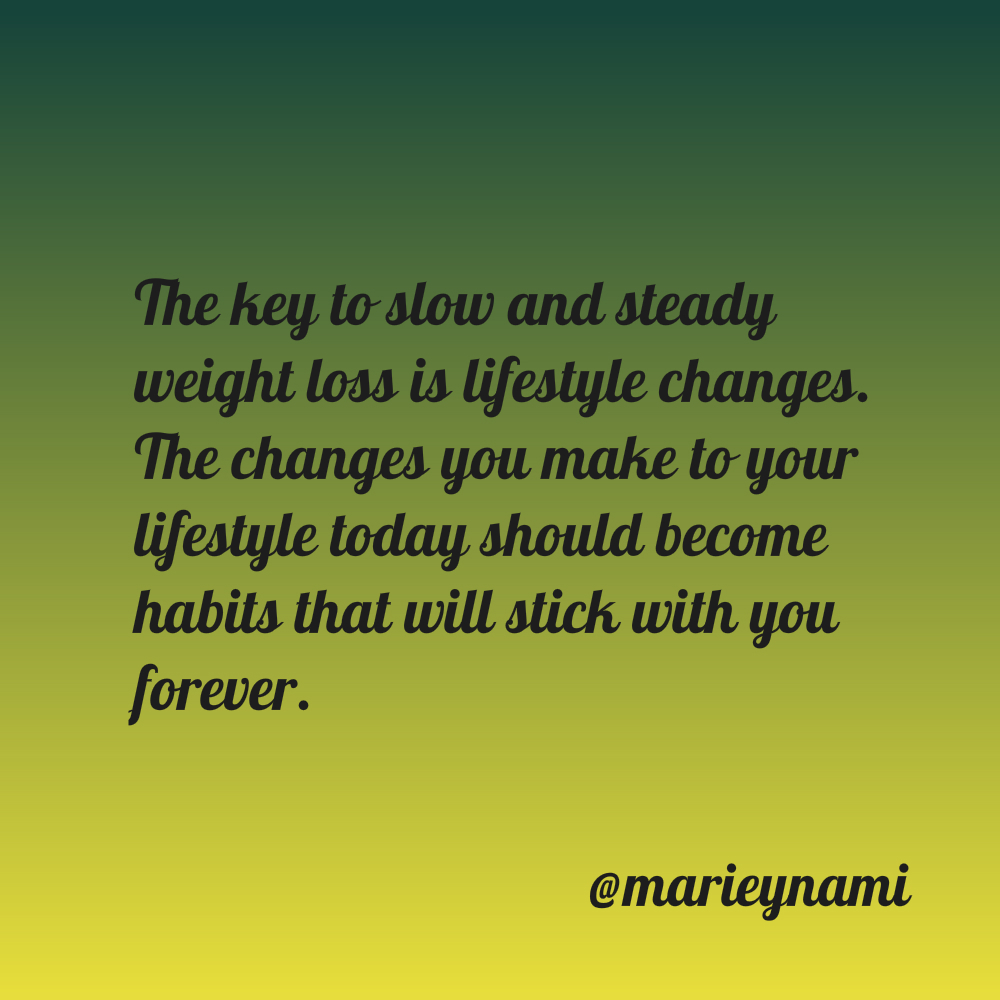
Let’s talk about getting back into a healthier shape. What I’m talking about is becoming healthier in a way and at a rate that’s sustainable. I’d like to emphasize a slow and steady weight loss. You didn’t put on those extra pounds overnight. Don’t expect to take them off in a matter of weeks. Instead, aim to lose half a pound to a pound per week. Believe me, it’ll still be a challenge most weeks.
The key to slow and steady weight loss is lifestyle changes. The changes you make to your lifestyle today should become habits that will stick with you forever.
Drink more water, cut out high-calorie drinks like soda and fruit juices. Cut back on sugar and refined carbs as much as possible. Stick with low sugar fruits, lots of non-starchy veggies, and protein. Don’t forget to add a few healthy fats. Yes, they are high in calories, but they’ll also keep you full longer.
Make it a habit to go for a 30-minute walk after dinner in the evening – or start a yoga class. Make an effort to move around more all throughout your day. Get up and walk around while you’re talking on the phone. Go play with the kids in the yard or ride a bike. Keep in mind that you can move in 15-minute spurts to meet your daily goals.
Small lifestyle changes will start to add up and you’ll see some slow and steady weight loss. And there’s another important reason why you want to keep it real and not try to do too much too fast. The end goal is to keep the weight off. And that will be easier with if you do it slowly by changing the way you eat, the way you move, and your whole outlook on life. Set yourself up for success by setting small weight loss goals and working toward them.
Yes, it takes some patience, but it will be well worth it in the end. Because the end goal is a healthier, more active version of you – someone that’s setting a great example for her loved ones.
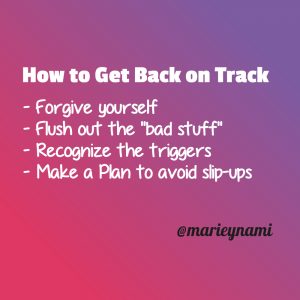
No matter how motivated and dedicated you are, chances are good that you’ll fall off your diet or exercise routine at one point or another. It may be because you had a rough day at work and fell back into the old trap of making yourself feel better with food. Or, it may be because of some unfortunate freak accident that made you stop working out completely.
It could be that you were invited to spend “happy hour” at the local bar or to a friend’s house and she served some delicious dessert. Or maybe you “took a break” over the holidays to indulge a bit in all your favorite treats.
Perhaps you got sick and needed some comfort food to make you feel better. There are hundreds of reasons why we get off track of our goals. Let’s accept that it’s going to happen. No need to beat yourself up about it. What’s important is what you do next.
How are you going to get back on track and keep this cheat meal or that indulgence day from turning into days and weeks of eating junk food, undoing all the hard work you’ve put in so far?
Forgive Yourself
First and foremost, there’s no sense in beating yourself up. What’s done is done. Forgive yourself and vow to do better in the future. Without forgiveness, you’ll beat yourself up for “failing” instead of just taking the next step forward. That’s all you need to do to be successful. Just keep on moving forward!
Flush Out The “Bad” Stuff
Many convenience foods and sugar in particular can be quite addictive, making it hard to get back on track. I find it helps to eat very clean for at least a day and drink as much water as possible to flush out the “bad” stuff. It makes it easier to get right back on track and stick to your meal plans. Whole foods, homemade foods, and things that come from nature are always better choices than anything from a box.
Recognize Triggers
After you’ve gotten back on track, take a look back and see if you can figure out why you slipped up. What caused you to reach for that tub of ice cream or why did you cave into eating that pizza after having the best intentions of sticking to a grilled chicken salad? Emotional triggers are huge saboteurs of an otherwise healthy eating plan. Recognizing what’s causing you to give in will help you avoid future slip-ups.
Make A Plan To Avoid Future Slip-Ups
Speaking of which, come up with some scenarios on what you can do next time to stay on plan.
For example, if you were meeting friends for dinner and ended up ordering the pizza or burger because you were just too hungry to consider getting the salad, have a snack before you leave the house.
If you’re so busy that it was easier to pull through a fast-food drive-through then think about planning ahead a little better.
If you had a bad day and found yourself reaching for the pint of Chunky Monkey in your freezer then consider not even bringing it into the house.
I hope these tips help you get back on track and reach your fitness goals – whatever they may be.
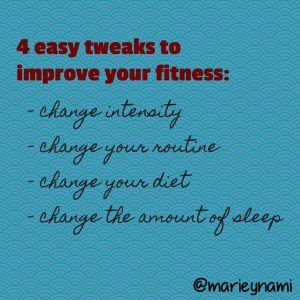
The human body is an amazing thing. If you do the same workout routine over and over, it will become more efficient at doing it and not have to work as hard. But, that means you are not burning as many calories, if losing weight is your goal, or tearing as many muscle fibers if you want to build muscle.
If your workout isn’t working out as good as it has in the past, you can get back in the groove by implementing these simple lifestyle tweaks.
Change the intensity
Because the body adapts to doing the same thing, you may have to change it up if you have hit a plateau. One easy tweak is to increase the intensity of your routine. For example, if you typically run on a treadmill for 30 minutes, instead sprint for a few minutes, walk, and sprint again.
Under this routine, you push yourself hard for a few minutes, rest for about half the time you pushed hard, and then push hard again. Keep this work/rest routine up for as long as you can.
Change your routine
Another change you can make is to do a different routine. This way you are challenging different muscles. Because muscles do adapt if doing the same thing over and over, your fitness progress may stall out. By switching to a different routine, it will push your body in different ways. To change intensity and routine, choose HIIT. It alternates between going all out for a few minutes, walking for a few minutes, and then going all out again. Keep up this routine for as long as you can. Expect to be sore the first time as it is something different for your body.
Change your diet
Changing your routine, intensity, and diet all at the same time gives your body the one/two/three punch it needs to get going again. Vegetables should be your mainstay of foods and you should be eating at least five to nine servings per day. In contrast, limit your intake of processed foods to lower the amount of saturated fat and sugar consumed.
All calories are not created the same. Take a 100-calorie cookie and 100 calories of carrots. Not only is the quantity vastly different, which means the carrots will fill you up more, but the nutritional make-up is very different. The cookie is basically empty calories while the carrots are nutrient-dense.
Change the amount of sleep
Getting enough quality sleep at night is paramount to good fitness. When you are sleeping, your body is recovering and your muscles are repairing themselves. And if losing weight is part of your fitness plan, you can actually gain weight if you are not getting enough sleep.
Changing intensity, routines, diet, and amount of sleep are just four tweaks of many that you can implement to get your fitness efforts back on track.
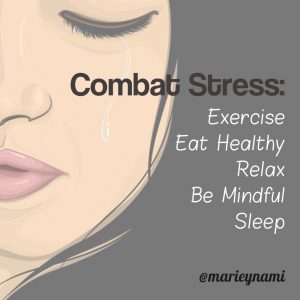
Stress is something that affects us all. Chronic stress is long-term stress that goes unattended over a long period of time. Stress affects our kidneys and the body’s entire system. Many diseases are stress-related; in fact, some experts estimate that up to 80% of all disease is stress-related. Stress causes many small and big health problems, including hypertension, headaches, insomnia, skin conditions, diabetes, depression, and anxiety just to name a few. Knowing that stress has such an impact on our health, it is important to take steps to combat it to whatever extent we can.
Here are five doable things that can help you defuse some of your stress levels and keep you that much healthier and happier.
Exercise
Regular exercise is known to boost your immunity, improve heart health and blood circulation, increase the amount of oxygen coming in through the lungs, and lower stress. It can also elevate mood as happiness endorphins are released during exercise. A workout of low to moderate intensity can increase your vitality, reduce pain, and improve your sleep. Exercise helps relieve some of the tension associated with chronic stress.
Eat Healthy
Eating well is an essential part of reducing stress. Too much fat, red meat, carbohydrates, and sugar in the diet put stress on the heart and the arteries. Chronic stress has been connected to the storage of fat around the middle.
Relax
Learn how to relax all your muscles; you can start at your head and work your way to your toes. Clench one muscle group for a few seconds, and then release. Move on to the next muscle group and repeat. As you relax, the stress response is turned off and the parasympathetic nervous system kicks in, aiding your digestion and your ability to experience peace and inner quiet.
Be mindful
Mindfulness is the act of focusing on the present moment. Instead of worrying about the future or obsessing over the past, try focusing your mind on experiencing the present moment. One way to do this is to become aware of your different senses: Listen to the sounds outside your window, feel the touch of your clothes on your skin, smell the aromas of your food, appreciate the colors around you, and notice the tastes of foods when you eat.
Sleep
A good night’s sleep will allow your body a deep and nourishing rest to heal itself; without good sleep, stress is exacerbated. To sleep well, avoid stimulants that can interrupt your sleep. Turn all technology off an hour before you turn off the lights. Also, turn the lights down for a while before you actually go to sleep. Use your relaxation skills to help you fall into a deeper sleep.
These everyday skills can help you combat stress. If you combine them all into your daily routine, you will undoubtedly see a reduction in your stress levels and an increase in your happiness levels. Exercise, healthy eating, relaxation, mindfulness, and good sleep are key elements in your health and well-being and are essential skills to have in your stress reduction toolkit.

Have you made the commitment to exercise and started out with all your zest and vitality, only to find that you’ve come crashing down to the ground really hard? Well, do not feel bad; we have all been there and done that.
The first step to incorporating exercise into your daily routine is the decision, the second step is the action, and the third step is the commitment. However, commitment comes with another component and that is to stay committed and to stay motivated.
There are several ways to conquer the motivation monster and here are a few ideas:
When all is said and done, if you keep a short journal about your positive exercise experiences and turn to it during those “I don’t have the time or I don’t feel like it” moments, you will read the results right off the page and get moving.

While you can think of a hundred reasons why you should skip your workout, have you ever thought about the reasons why you should not skip? Before we get to those reasons, ask yourself these questions:
Why Do I Want to Skip Working Out?
Is there something going on in your life that is causing you to not workout? Are you mentally or physically stressed in some way? Actually pushing through it and exercising can make you feel better.
How Will I Feel If I Don’t?
If you skip your workout, most likely you are going to feel guilty about it and mad at yourself. Do you really need that extra pressure? The mental consequences will be far less if you just go ahead and do it.
Is There An Alternative?
If you don’t feel like doing your normal full-blown workout, is there something you could do instead? For example, if you don’t feel like running, how about walking for 30 minutes instead? Anything you do is better than doing nothing at all!
6 Key Reasons to Not Skip Working Out
The next time you consider not working out unless you are really sick, think about all the good reasons why you should put on your workout shoes and do your workout. Once working out becomes part of your healthy lifestyle, you will look forward to each exercise session as a way to build a better you.

So, you want to start working out, but you aren’t sure of the best plan of attack? There is nothing to be ashamed of, as there are many people who want to start paying closer attention to their fitness but don’t know where to begin. Whether you want to lose 10 pounds or 50, there are a number of things that you can do to help ensure that you will shed those unwanted pounds in the most efficient way possible.
Here are a few workout tips for beginners.
Make a schedule – When people first decide that they want to take charge of their fitness, it is a good idea to make a workout schedule. Life can be hectic and busy for some, but if you schedule in your workouts, there is no reason why you won’t be able to fit it in with your daily routine.
Develop A Habit– Develop a fitness habit by working out every day. Daily workouts no matter how small will keep you on track.
Set goals – Some people choose to start working out with the only goal in mind being to lose weight. There is nothing wrong with wanting to lose weight, but there is more involved than just expressing this desire. Along with making a workout schedule, you will also want to know how much weight you want to lose and by what date. These goals should be attainable, so you won’t be discouraged by failing to lose the weight you want.
Warm-Up – Exercising can be exciting, so people tend to want to jump right in and get going. Your body needs to be prepared for the workout it is about to endure and warming up will help with that. Take five or ten minutes before your actual workout to get your blood pumping and decrease your chances of injury by warming up.
Stretch – Stretching before your workout is just as important as warming up. Even when you are not planning to workout, stretching is beneficial. Stretching keeps your muscles flexible, so when you work out, you are less likely to pull or strain your muscles. It is fairly easy to injure yourself if you do not prepare for your workout, but if you take even five minutes to stretch a bit before starting, you can avoid that painful injury that may cause you to quit before you even begin your weight loss journey.
Start slow – You may be tempted to go all-in and workout seven days a week for two hours every time you go to the gym, but this may be too much for your body. Starting slow and building on your workout is the best way to start. You will be giving your body time to get used to this new level of activity and you won’t tire yourself out before seeing any results from your efforts.
Mix it up – Try new exercises every chance you get. Not only does this keep things interesting and exciting, it gives you the chance to figure out what exercises you prefer and which ones you dislike. You don’t need to complete a different workout every day, but consider switching things up from week to week or starting a rotation of exercises you enjoy.
Don’t avoid challenging exercises – They are the ones that advance your fitness levels. When exercise gets too easy it has little effect
Learn your limit – Everyone likes to push his or her limits when trying to reach a goal, but when working out you may cause more harm than good. Doing more than you can handle may lead to injury, so instead of pushing yourself too hard, do what you can. When your body is used to working out and engaging in strenuous activities, you can add to your workout plan.
Don’t Give Up! – Remind yourself regularly of what motivates you to get and stay fit.
You may be a beginner, but that doesn’t mean you can’t learn how to work out properly. Following these tips will allow you to have the positive workout experience that you have been looking for and meet your weight loss goals. Your health is important and even though staying on top of your fitness can be hard, it can also be fun and rewarding for anyone who sticks to it.

We all know about certain benefits of exercising – above all, that it’s good for us. But this isn’t always enough to get us motivated into actually doing it. If you’re looking for a little inspiration to get started, here are 10 reasons why exercise can improve your life and why you should make it your top priority.
1) More Energy: Although exercise in itself may be tiring, one of the major benefits of exercising is the fact that it’ll ultimately leave you feeling more energized. Studies have shown that regular exercise helps to reduce fatigue.
2) Increase Your Mood: Every time you exercise your body will release endorphins that help to make you feel good. Exercise really will give you a natural high!
3) Improve Your Health: There are so many health benefits of losing weight that it’s impossible to list them all here! By getting fit you’ll reduce the risk of diabetes, cancer, high blood pressure, stroke, heart disease and much more.
4) Improve Your Appearance: If being overweight or not being toned leaves you feeling unhappy about yourself then losing weight can help you to look and feel better.
5) Play With Your Kids: It takes a lot of energy to keep up with your kids. By losing weight and getting fit, you’ll be able to run around with them without constantly getting out of breath. This can be one of the most rewarding benefits of exercising: it helps you to enjoy life more.
6) Sleep Better: When you exercise more you’ll start to find it easier to get a good night’s rest. This adds to the energy boost that you’ll get from exercise in the long term.
7) Increase Your Strength and Stamina: Do you find it hard to go on long walks, even though you want to? Or maybe even carrying shopping bags up the stairs is a struggle? Exercise more and you’ll eventually be able to handle these activities with ease.
8) Reduce Stress: Exercise can hugely reduce stress levels. If you regularly suffer from stress – or even mental health issues such as depression and anxiety – regular exercise can help to reduce your symptoms.
9) A Sense Of Achievement: When you start to exercise and see the improvements you’re making week on week, you’ll really get the feeling that you’ve achieved something worthwhile!
10) Keep Your Independence Later In Life: The more you can exercise now, while you’re still able, the more you can reduce the impact of certain health problems later in life. In short, keeping fit and healthy will help you to keep your independence as late into life as possible.
So how much will you need to work out to feel these benefits of exercising? That all depends on your current fitness levels. The good news is that just 30 minutes of exercise a day is enough to improve your health drastically. So what are you waiting for?